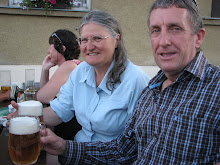
We decided to take a few days away from the cities and visited Gauja National park which was only an hour's drive from Riga.
We booked into a bed and breakfast place that is owned by an 80 year old Latvian woman. The house was two storied with a large glass conservatory upstairs as well as 4 bedrooms. She put us downstairs in what doubled as a lounge and dining room. We slept on a couch that folded down into a double bed. it was a huge room and one wall full of books.
Tija, the owner, did not speak any English so we had to communicate in my very rusty German. She spoke clearly and simply and that helped a lot. She told us that she worked as a gynacologist at the local hospital until 12 years ago. If I had more German vocabulary it would have been interesting to hear how life was under the Russians.
Tija had an enormous garden with rows and rows of potatoes. She also had a glasshouse with a heater that was entered from the basement of the house. She had tomato plants and herbs growing there.
Tija had traveled several times across the USSR and had once taken a cruise by ship to Japan, Malaysia and Singapore.

Nearby Tija's house is a bobsled track. It was once the main training track for the Soviet bobsledders and lugers. It was closed when we visited but it is possible in winter to sled with a professional driver at 100kms per hour.
We visited the local tourist office and found some trail maps that we could walk in the national park. Although the park is supposed to have 150 bird species and 50 different mammals we only managed to see a few birds, a dead mouse and this sole squirrel.

We visited the 800 year old medieval Turaida Castle.

Latvia is pretty flat and so the castle sits on a small mound beside the river. Some of the other castles in the area are in ruins but this has been renovated and is part of a compex that shows life in different centuries.

The town near the castle has many old stone houses and this one has all the letterboxes for the residents in this street attached to its wall.

